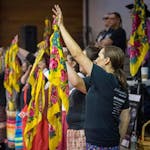CHICAGO – At Pocket Con, the youth-centric Chicago comics event focused on diversity, exhibitor First Aid Comics didn't display a single copy of Marvel Comics' "Ironheart" — curious in that the book features a black female teen superhero from Chicago's South Side, and is written by Eve L. Ewing, a black woman who also is a South Sider.
Actually, it's not so curious at all.
The book was so popular, said Kenny Taylor, First Aid's social media manager. that they didn't have any copies to bring.
People lined up at the Hyde Park shop an hour before the store opened for a signing the Saturday after the first issue dropped. Taylor at the time was scouring the city to try to buy additional issues, as the store had sold out the first day it was available.
"The city showed out for Eve Ewing like nobody's business. She had young women, young boys, old, young, everybody, wanting to talk to her about the character," Taylor said. "We had people who weren't sure about it but talked to her about it and were going to give it a chance."
As more diverse creators enter the comics pool, more black women are coming into shops and inquiring especially about books written and drawn by other black women. Joshua Kelly, manager of Graham Crackers Comics, has seen this firsthand at his shop.
"People do come in and specifically ask for them because they heard about it," he said.
That seems to be the case particularly in Chicago, which is dripping with black female comics creators — a group that was pretty much nonexistent on the main stage 10 years ago.
Ewing is one of two local black women recently tapped by Marvel — which didn't even have its first black female writer until Roxane Gay in 2016 — to write titles featuring black female superheroes.
Award-winning novelist Nnedi Okorafor's "Shuri," starring the tech genius Wakandan princess, debuted last October and follows her work on "Black Panther: Long Live the King" and the "Wakanda Forever" three-parter featuring the Dora Milaje.
Meanwhile, Hyde Park artist Ashley A. Woods recently penciled the four-issue limited series "Tomb Raider: Survivor's Crusade" for Dark Horse Comics and will have her work in the Jordan Peele and J.J. Abrams-produced HBO show "Lovecraft Country," based on the drama/horror novel.
And C. Spike Trotman, who runs Chicago-based alternative comics publisher Iron Circus Comics, released "Delver" in February. She co-wrote the fantasy series for the Originals section on Comixology, Amazon's digital comics service.
Most of these black women in comics spoke or exhibited at C2E2 recently. That includes Yorli Huff, who turned her experience as a Chicago undercover drug agent facing discrimination into the comic series "Superhero Huff."
"I wanted to share my stories with black and brown teenage girls, but she's appealing to every race and every age group," Huff said.
"I have been humbled and grateful by the reception No. 1 has received, from hard-core comics fans to folks who have never been inside a comic book store before now," Ewing wrote in an e-mail of "Ironheart."
"I'm especially moved by how many parents are copping it for their kids. That's just an amazing feeling."
It's significant that both black teenage characters created by men — "Ironheart" by a white man and "Shuri" by a black man — have been turned over to black women writers, said Regine Sawyer, owner of Lockett Down Productions and founder of the Women in Comics Collective NYC International.
"It makes a huge difference in the sense of having authentic voices that write different comic books that have black female characters in it," she said. For years, these have been written by white heterosexual men. The rest of us would read the stuff and say, 'No, as a black woman, I would not say that about my hair.' It's about representation. It's about inclusion."
Cultural anthropologist Stanford Carpenter, a sometime comics creator who chairs the board of the Institute for Comics Studies, agrees.
"We talk about diversity on one hand, but not what that diversity could look like. For a while, it was, 'We need more black and brown characters,'" he said. "Now, we're starting to ask questions about who's creating the stuff."
Okorafor's latest character for the new Dark Horse Comics "LaGuardia" series — a pregnant Nigerian-American doctor in a story of alien immigration issues — is an example of a black woman bringing a unique perspective to the medium, Stanford said.
"We actually get a story where the main protagonist is a woman who's pregnant and that's part of who she is. It's not a major plot point. In our society, we tend to represent pregnancy as an illness; something that a woman has to overcome," he said. "I can't think of too many men who would come up with that idea."
Afrofuturist writer Ytasha Womack debuted the "Eartha 2198" book series in February and in May will launch a Kickstarter campaign — where she's a creator-in-residence — for the Afrofuturist novella series "A Spaceship in Bronzeville." She sees women driving demand for diversity in science fiction and comic books.
"It's a zeitgeist moment. You have these incredibly talented creators and you have an increase in demand in the perspective that they bring," said Womack. "At the end of the day, people want to tell stories. And being able to tell a story infused with your cultural perspective is a very natural thing to do."
Those types of stories, frequently with nods to black experiences — are a sweet spot at Amalgam Comics and Coffeehouse in Philadelphia, which is owned by a black woman.
"For us, those books do really well. People will come in and say, 'I have a little girl and I want anything with a young black girl as the center of the story,'" said founder Ariell Johnson.
"There are books we sell out of constantly and are constantly reordering, and those books aren't even present in other stores."





